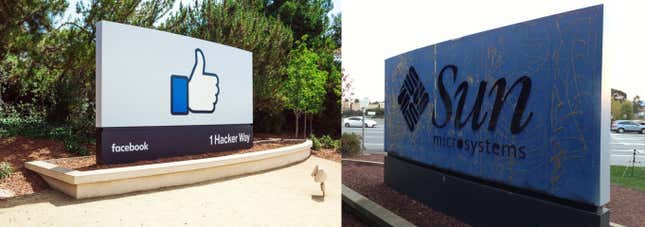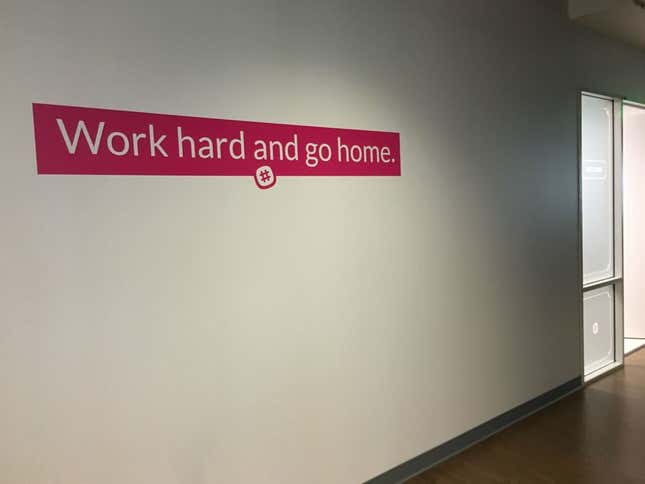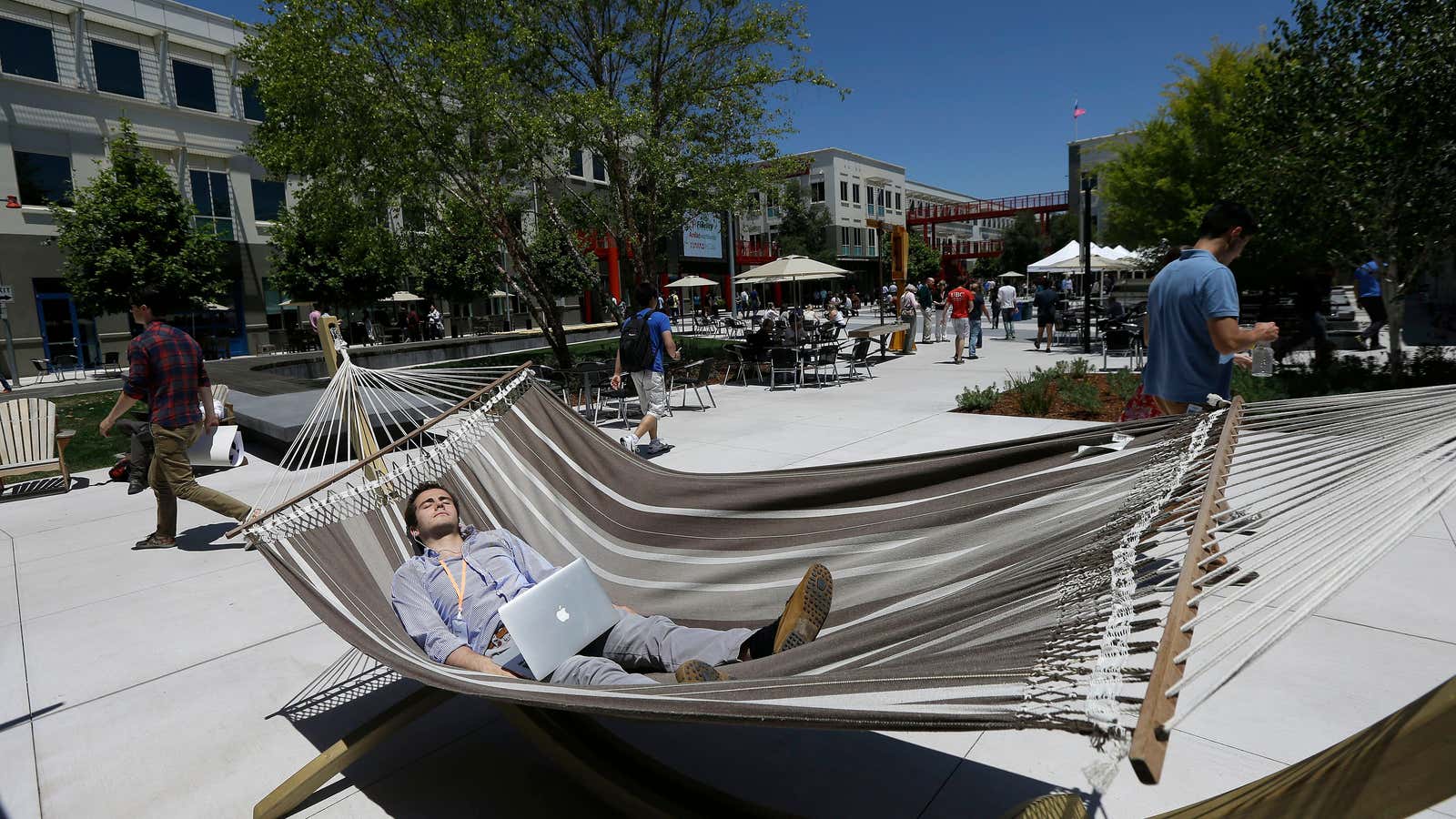I was there to see the headquarters of one of the most influential technology companies in the world, and it looked like a Lego fortress. The campus was all primary colors and serrated edges, as if cut from card stock for an elementary-school bulletin board.
Street art hung from the walls. Bicycles and scooters were strewn like forgotten toys. The corporate name was decapitalized. (Something about trying to be cool.)
“We repurposed the sign from the old Sun Microsystems campus,” my greeter said when she met me at the campus’ entrance. “We leave it as a reminder to stay motivated.”
As we walked past the iconic thumbs up on the front of the sign, I turned around to see the faded “Sun” on the back of it.
“Welcome to Facebook.”

For a company built on openness and connectivity, the office felt like the walled garden Facebook itself has become. My greeter walked me to one of the complex’s main arteries from Hacker Way toward Main Street. “The campus was designed to be a cross between Disneyland and downtown Palo Alto.” I could tell. Thousands of employees filled the streets of Facebook’s downtown area, a Main Street USA in a Magic Kingdom partial to hoodies and t-shirts.
There was a barbershop, a dental office, a bike shop.
If I worked here, I would never have to leave.
Live to work
The gilded offices of Silicon Valley have both the amenities and exclusivity of a country club. The need to keep the outside world locked out is understandable—tourists come from halfway around the world just to take pictures from Google’s driveway—but I worry that the locks go both ways.
“Orwell warns that we will be overcome by an externally imposed oppression. But in Huxley’s vision, no Big Brother is required to deprive people of their autonomy, maturity, and history,” wrote media theorist Neil Postman. “As he saw it, people will come to love their oppression, to adore the technologies that undo their capacities to think.”
The office is also a technology, a tool used to help get work done. And though there is something special about a workplace where you can get your dry-cleaning done between meetings, the blurring of work and not work can also veer toward oppression.
The catered dinners, bottomless vacations, and open floor plans set up by employers to promote productivity and work-life balance can—at times—have the opposite effect.
It doesn’t have to be crazy at work
“It’s no wonder people are working longer, earlier, later, on weekends, and whenever they have a spare moment,” Jason Fried writes in the new book It Doesn’t Have to be Crazy at Work, which hits the shelves in the US today (Oct. 2). “People can’t get work done at work anymore.”
“Once you examine these [perks], they look a little less like benefits and more like hooks,” says Fried’s co-author, David Heinemeier Hansson. “It’s not that ping-pong tables aren’t nice in an abstract way, but they can also wreak havoc on everyone else in the office’s ability to get things done.”
Hansson and Fried have a horse in the race to rethink how organizations are organized. Together, they founded Basecamp, a software company that has embraced remote work since it launched in 1999 with some unconventional approaches to benefits. For example, instead of catered meals, Basecamp pays for CSA produce boxes for its employees to cook with at home.
The pair has written multiple bestsellers challenging conventional wisdom about how we work. And a growing body of research backs up their opinions.
One study found that employees with unlimited vacation policies took fewer days off on average than their limited vacation counterparts. Another found that coworkers communicated less frequently face-to-face when they worked in an open-floor-plan configuration.
“Open workplaces are interesting in that they symbolize collaboration and communication, but they also have to provide spaces to actually get work done,” says Deano Roberts, the global facilities director at Slack. Roberts, who also serves as a lieutenant colonel in the US Army Reserves, has a very pragmatic approach to office perks.
“There is no line you can draw between free kombucha and people’s satisfaction in their job,” he says. “If the reason you’re attracted to your employer is that they have free cupcakes, there are a bunch more cultural issues you have to unpack.”

Work hard, go home
On the walls of Slack’s office, there is a sign that summarizes the company’s philosophy on work. Its message is simple: work hard and go home.
At Slack, you won’t find an office gym or catered dinners. The goal of the office, according to Roberts, is to make it as easy as possible for employers to get their work done and get on with their lives. Walking through its San Francisco headquarters is rather boring—in a good way. There are no slides, no ironic, life-sized Jenga blocks or scooters buzzing the hall. It felt like a place to, well, work.
And shouldn’t that be what offices are optimized for? The office doesn’t need to be your bar or your gym or your go-to dinner spot, and not because cocktails or office gyms or catered dinners are inherently bad. It’s that work should be a means to an end. And in the end, we should go home.
Before I became a journalist, I worked in an office with hot breakfast in the mornings and yoga in the evenings. I was #blessed. But I would reflect on certain weeks—after a string of days where I was lured in before 8am and stayed until well after sunset—like a driver on the highway who can’t remember the last five miles of road. My life had become my work. And my work had become a series of rinse-and-repeat days that started to feel indistinguishable from one another.
The ease with which one can extend the workday is not, in fact, a perk at all. I’ve come to the conclusion that the best office is one at which you look forward to arriving, and don’t feel bad about leaving.
